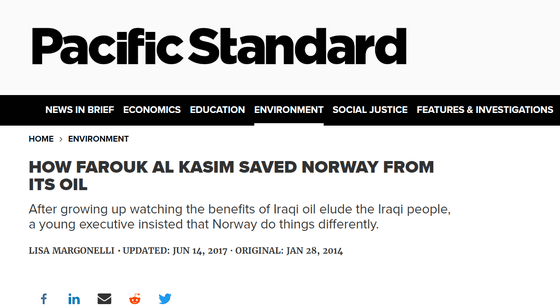It was thanks to the success of only one Iraqi petroleum geologist that Norway escaped the corruption, infighting, and wealth disparities that oil-producing countries tend to fall into.

Oil is now an indispensable resource for modern people, and there is an impression that oil-exporting countries, mainly in the Middle East, are rich in petrodollars. It is said that there are many cases of dysfunction called 'resource curse'. But Norway, Europe's largest oil exporter and the world's second largest natural gas exporter, has escaped this 'resource curse,' according to Norwegian petroleum geologist Farak Al Qasim. Thanks to that, news site Pacific Standard explains.
How Farouk al Kasim Saved Norway From Its Oil - Pacific Standard

Originally from Iraq, Al-Qasim studied at Imperial College London, funded by the Iraqi government, before becoming an executive at an Iraqi oil company , where he managed oil and money. He then moved to his wife's home country of Norway to raise a son with cerebral palsy and got a job analyzing North Sea drilling test results.

When Mr. Al Qasim examined the data of the Norwegian geological survey, it turned out that there was a ridiculously large oil field sleeping in the North Sea. At that time, Norway did not have the know-how to handle oil, but it was fully expected that a large amount of oil would have an immeasurable impact on national policy.
“I have suffered as an imperialist pawn,” Al-Qassim said. ' said. In the late 1950s and 1960s, many countries in the Middle East sought to replace the international oil companies with state-owned oil companies in an attempt to solve the problem of oil 'imperialism.' However, as a result, oil, money, and power were concentrated in a few people, causing economic stagnation. “Replacing the monopolies of international oil companies with state-owned monopolies alone is not an improvement,” Al-Qassim said.
December 1969. As predicted by Al-Qassim, energy company ConocoPhillips has discovered the Echofisk oil field in the North Sea. A year and a half later, Al Qasim and his colleagues wrote a white paper calling for the creation of a national oil company, Statoil (now Equinor ), and a powerful independent regulatory body, the Norwegian Petroleum Authority (NPD). Al-Qassim introduced the idea of avoiding a state oil monopoly by aligning the foreign oil industry and state oil companies.
With this idea, Statoil will promote the development of professional skills in the country and secure jobs for Norwegians. However, they were required to submit an annual report in consultation with the government's Ministry of Petroleum Industry. On the one hand, the NPD aims to act as a kind of referee to ensure that oil projects are in Norwegian interests, while minimizing environmental impact, while maximizing Norwegian employment and profits. was
The Norwegian government accepted Al Qasim's idea. The government threw in tax money, invested in oil field development, and took half the risk. Norwegian stakes allow private oil companies to venture into financially risky innovations. And when the oil industry started to turn a profit in the 1990s, Norway deposited the profits in a fund in preparation for the day the oil fields ran out. The fund is said to reach $ 800 billion (about 110 trillion yen) at the time of writing the article.
On the other hand, since NPD has set the goal of 'reducing marine pollution from drilling to zero', it seems that there are almost no drilling chemicals discharged into the sea from Norway at the time of writing the article. At the same time, oil companies collaborated to develop new procedures and materials to maintain profitable access to oil fields.
Al-Qassim also said he was obsessed with 'squeezing every last drop' from the country's oil fields. In the late '70s, just a decade after ConocoPhillips drilled its first oil field, production at the Echofisk field plummeted. In general, when oil is extracted from a stratum containing oil (oil reservoir), the pressure within the reservoir drops, resulting in a decrease in oil production over time. So Al Qasim suggested injecting water to increase the pressure. ConocoPhillips adopted this idea by Mr. Al Qasim, and it seems that the Echofisk oil field has been revived.

Mr. Al Qasim served as NPD's Director of Resource Management for 18 years and was awarded a knighthood by the King of Norway in 2012 in recognition of his achievements. ``One of the modern myths is that technology solves everything,'' Al Qasim said. ``But science rarely gives the right answers at the right time, and technology without a social vision is just a thing. What kind of vision do we have of human organization?”

Related Posts:
in Note, Posted by log1i_yk






